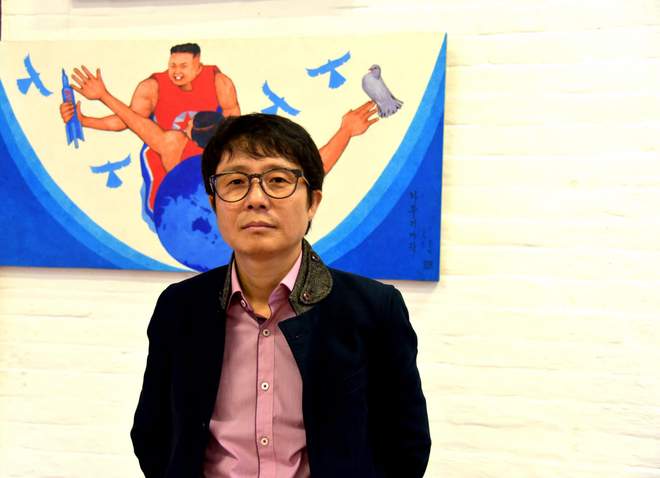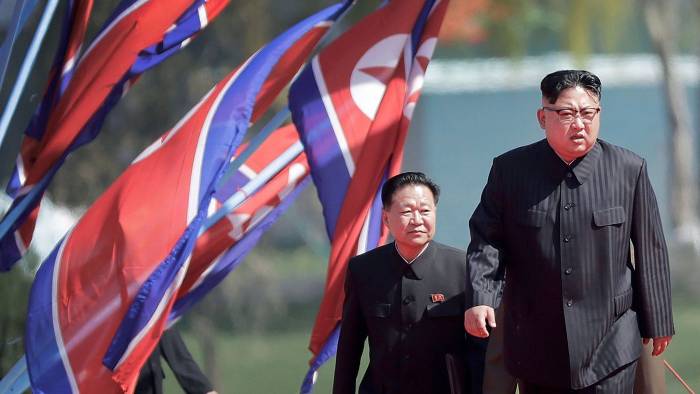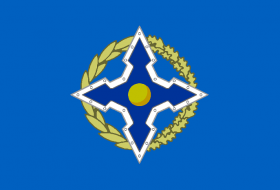For this reason, Song Byeok has dedicated his life to educating the world about what it is like to live under the Kim regime. The former official state propaganda artist does this with the help of his paintbrush – using artwork to depict a dystopian lifestyle.
“I paint because I lived in North Korea for 30 years so I want to represent what life is like there,” the 48-year-old told.
Satire was not always a medium available to Mr Song. Under the iron-clad rule of the late Kim Jong-il, artists were not granted the freedom to paint what they wanted, instead having to adhere to a “strict list of instructions”.
Although it was poverty which initially spurred Mr Song to try his hand at painting, the elite classes quickly noticed his talent, and at the age of just 24 he was selected to become an official state propaganda artist.
“I got into it because my family was too poor to send me to university and I had an interest,” he explains. “But then I started painting propaganda posters which included sculptures, labourers, and political slogans.”

Song Byeok has dedicated his life to educating the world about what it is like to live under the regime (Helen Hoddinott)
Growing up in the most secretive and isolated country in the world, Mr Song did not once doubt the regime he lived under. According to the UN the overwhelming majority of North Korea’s 25 million citizens live with the threat of the Gulag, forced labour camps and public execution but Mr Song remained wholly unaware of this as a teenager.
Compulsory participation in marches is unsurprising when you consider that North Korea has the highest number of military and paramilitary personnel relative to its population of any country in the world.
It was when the famine of the 1990’s hit that Mr Song started massively doubting the regime. While the country continues to struggle with food production, the famine which is known as the Arduous March is estimated to have killed three million people.
“I stopped believing in the regime during the famine. I saw many of my neighbours starve to death. All of my family members had already died in the famine, but my father and I tried to escape across Tumen River but he was swept away and drowned. I tried to find his body and even asked a soldier to help me find it. That’s when I was captured”.
Mr Song was then taken straight to a prison in North Korea. There he endured slave labour and beatings – with one incident so bad his finger was amputated despite no anaesthetic being available.
“I was held in a prison specifically for North Koreans in China who were captured between the borders of China and North Korea. I was released after six months because there were so many people dying in prison, and they were tired of getting rid of the dead, so they told the prisoners to go home and die there.
I made up my mind that if I was captured again I would commit suicide and kept some poison in my pocket,” he says. “During my escape, the moonlight was so bright I was even afraid of being shot by a soldier at night. I hid for two days in the mountains, until one day the soldiers were having lunch and I managed to get to the river and then I swam across to China.”
Once in China, he went into hiding but says he was fortunate enough to meet some people who helped him find his way to South Korea where he now works as a painter. Mr Song now dedicates his life to shining a light on North Korea's human rights violations - injustices which international organisations argue have no parallel in the contemporary world.
While his most famous painting continues to be an iconic image of Marilyn Monroe holding down her dress which has been replaced with Kim Jong-il’s head, he has expanded his dissident work to critique other oppressive regimes.
Like so many defectors, Mr Song has no contact with the friends he left behind in North Korea because he fears they will be tortured by the regime if he is in touch.
“It is too dangerous now to contact anyone I know in North Korea. It’s also expensive - I’ve heard brokers charge 1000 euros to pass messages.”
Mr Song’s work is being shown for the first time in the UK at an exhibition hosted by Connect: North Korea which is being held at Amnesty International's offices in east London.
Read the original article on the Independent.
More about: NorthKorea
















































